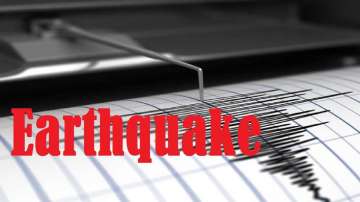High-frequency of earthquakes in the past two months in Delhi-NCR signals some strain energy is developing accumulated as a result of northward movement of the Indian plate. Though these tremors do not signal any big event but a strong earthquake in the region cannot be ruled out, PIB reported.
"All the earthquakes in Delhi-NCR are due to the release of strain energy, which has been accumulated as a result of northward movement of the Indian plate and its collision with the Eurasian plate, through the fault or weak zones," Wadia Institute of Himalayan Geology, an autonomous institute of the Department of Science and Technology said.
The institute while explaining the cause behind tremors in the past few days in the Delhi-NCR region said, "Delhi-NCR tremors do not signal of a big event, though a strong earthquake cannot be ruled out."
"Such tremors are not unusual in the Delhi-NCR region, but indicate that strain energy is built up in the region."
Delhi-NCR in Seismic Hazard Zone IV
Delhi-NCR has been identified in the second-highest Seismic Hazard Zone IV but the recent events cannot be defined as the 'foreshocks'.
The Wadia Institute of Himalayan Geology further said since the seismic network is quite good, present micro to minor earthquakes in and around Delhi-NCR could be recorded.
"Though our understanding, in terms of when, where and with how much energy (or magnitude) an earthquake can occur, is not clear, but the vulnerability of a region can be understood from the past seismicity, calculation of strain budget, mapping of active faults, etc. The Delhi-NCR has been identified as the second highest seismic hazard zone (Zone IV). Sometimes, a vulnerable zone remains quiet, experiences small magnitude earthquakes that do not indicate any bigger earthquake, or receives a sudden jolt by a big earthquake without any call. Out of 14 small magnitude earthquakes in the Delhi-NCR, the 29th May Rohtak earthquake had magnitude of 4.6," Wadia Institute said.
Recent tremors in Delhi not foreshocks
The recent tremors in Delhi-NCR cannot be termed as 'foreshocks', however, if a strong quake occurs in the region then all smaller events that occurred in the immediate past in that region will be categorised as foreshocks.
Therefore, scientifically all these tremors in the Delhi-NCR can be demarcated as the foreshocks only after a big earthquake takes place immediately.
Though it cannot be predicted, a stronger earthquake posing a threat to people and properties cannot be ruled out. Since an earthquake cannot be predicted by any mechanism, the tremors cannot be described as the signal of a big event.
Delhi-NCR, nearby districts earthquake history
In 1720 | 6.5 magnitude at Delhi
In 1803 | 6.8 at Mathura
In 1842 | 5.5 near Mathura
In 1956 | 6.7 near Bulandshahar
In 1960 | 6.0 near Faridabad
In 1966 | 5.8 near Moradabad
ALSO READ | Indian Army, Air Force on alert in Ladakh; attack helicopters, reconnaissance planes fly over Leh
ALSO READ | Public mood towards China turns the clock to 1962
